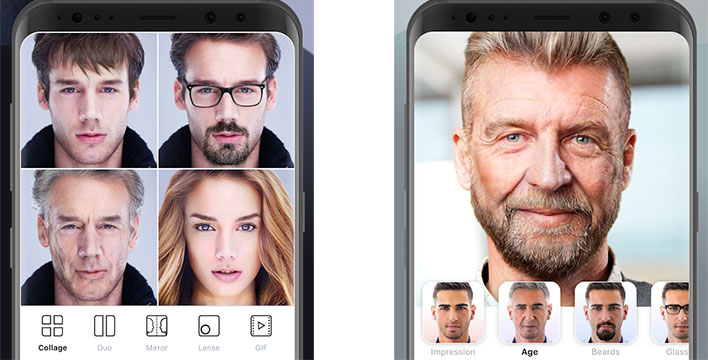Viral FaceApp Takes Social Media By Storm, But Is It Invading Your Privacy?

I can no longer scroll through my Facebook or Twitter feed without seeing an image of someone I know who has been digitally aged, or altered in some other way. That's because FaceApp has gone viral again. In case you missed it (impossible at this point), this mobile application lets you apply various filters to your selfies and photos, and the in-thing to do right now is to use the Age filter and post the result. While hugely popular, there are some privacy implications that come with it.
It is not just your Facebook friends and family members who are goofing around with FaceApp—celebrity actors, athletes, and musicians are also partaking in the fun. And yes, it is fun (and funny). One of my favorites right now is a doctored image of New England Patriots quarterback Tom Brady (also know as the G.O.A.T.) looking very old, and very accomplished...
@TomBrady Hi Tom - figured I’d do your FaceApp for you after another 20 years in the league... 😉👍🏻 pic.twitter.com/QzcX0WX0nM
— Joe C ⭐️🇺🇸⭐️🏈⭐️ (@FightTheSwamp) July 17, 2019
The image is further altered with more championship rings, but give it time and he'll earn them all anyway. But I digress. While the FaceApp craze is all fun and games at the moment, does it come at the expense of privacy?
There are some startling things you should know about FaceApp. First, the app's origins trace to Russia, and that in part has prompted Senate Minority Leader Chuck Schumer to write a letter to the FBI and FTC urging the agencies to launch an investigation, Business Insider reports. The concern is that it "could pose national security and privacy risks for millions of US citizens."
Meanwhile, Geoffrey A. Fowler at The Washington Post grew concerned over the app's vague legal language and did a bit of forensic digging. What he found "unsettling" about the situation "was how much data FaceAppp was sending to its own servers."
He followed this up by interviewing FaceApp CEO Yaroslav Goncharov, who ensured that FaceApp only uploads photos that are selected by a user for editing, and not the entire camera roll. Interestingly, Goncharov also reiterated that the terms of service grants FaceApp a "perpetual" license to use those photos.
According to Goncharov, the photos are not being used to run or test facial recognition technologies, even though FaceApp is legally permitted to do so (based on the ToS). Not only that, but the fine print gives FaceApp the right to use your uploaded photos however it sees fit, by way of an "irrevocable, nonexlusive, royalty-free, worldwide, full-paid, transferrable sub-licensable license."
In other words, it can use and/or sell or license your photos for whatever purpose. Yikes. That includes handing them over to the Russian government, though Goncharov says that Russian authorities do not have access to the photos. Furthermore, users can put in a request to have their photos deleted from FaceApp's cloud.
It takes a bit of trust that FaceApp would actually follow through with that request. The bigger point, though, is that as fun as it might be to apply a filter to your selfie, you should be aware of the usually boring (but in this case, enlightening) legalese before doing so.

